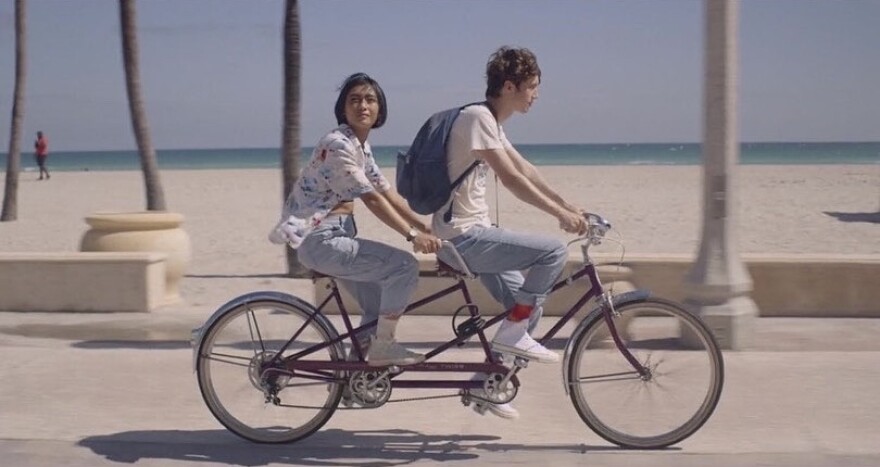The coming of age film "Three Months" by writer and director Jared Frieder tells the story of high school student, Caleb Cohn, who has to wait the whole summer to find out the results of his test as he grapples with loss, heartache and loneliness.
Frieder shared his experience bringing his story to life. The movie is now streaming on Paramount Plus.
WLRN: What was the inspiration behind the movie?
FRIEDER: It was really important to create the type of film that I wished I could have had growing up. One that would have made queer kids feel less alone. This is a story about a gay kid coming of age, but it's also a story about waiting. And it's the story of what he does while he waits, and how he finds himself and finds hope for his future, no matter what his diagnosis is.
This takes place before PrEP, but in the time period after HIV was a death sentence. PrEP is a pill that you can take every single day that prevents you from contracting HIV if you're exposed to it. Another thing that was super important for me with this film was to show that when you have access to medical care, HIV is no longer a death sentence. Growing up in the public school system in Florida in the 2000s, I didn't know that.
WLRN: There are a lot of moments in the film that evoke a sense of place. Were there specific cultural aspects of South Florida that you wanted to show?
FRIEDER: I am a Florida boy, born and bred. I grew up in Cooper City, Florida, which is just north of Miami. We filmed on the Hollywood Beach Boardwalk, which is where I went every Saturday, growing up in my youth. It was just important for me to authentically reflect life down there.
WLRN: The main character, Caleb, played by singer-songwriter Troye Sivan, has a sardonic sense of humor. How did you balance the serious aspects of the subject while keeping the story fairly light?
FRIEDER: Life to me is not completely dramatic or completely comedic. It's in the in-between. And especially, you know, as queer people, we use humor and comedy as a defense mechanism to overcome the challenges that we face. But also, I wanted to write a really fun coming of age story that people can lose themselves in, that they can enjoy. And yes, it talks about serious themes and subject matter, but it's not like a pill you have to swallow.

WLRN: As we enter the third year of the COVID-19 pandemic, there are some parallels between the moment in time and what characters are dealing with — the uncertainty of a virus, themes of guilt and shame around contracting it, and lots and lots of waiting. Were there parts of pandemic life that seeped into your story?
FRIEDER: A lot of my time was honestly like binge-watching TV. And, you know, Caleb's a character who's waiting, but he's incredibly active while he's waiting. And I figured that there needed to just be a thread in the movie where, like, he's just had it and he just needs to, like, lay in bed, and I was like, Oh my God, what can he be watching? We have absolutely no money left. And the movie was financed by MTV Studios, which, as you know, did The Real World San Francisco …
WLRN: … which tells the story of Pedro Zamora who was on that show. He was the first openly HIV-positive person on reality TV, and he was also from Florida.
FRIEDER: Yes, exactly. It inspired me to go back into the script, rewrite this thread where he's paying tribute and watching Pedro's story unfold. And the reason that I'm here with the rights that I am able to have is because there are so many of my queer ancestors who came before me, who made my life easier. I really wanted to honor them with this film, and this thread also allowed me to do that.
WLRN: Caleb often references his Jewish faith in the movie. He even wears the Star of David on his bracelet even though he's somewhat estranged from his religion. Why was it important for you to include that as part of his narrative?
FRIEDER: I'm Jewish. I grew up Jewish in Florida, in a conservative Jewish community. And it was just a part of my life that felt like it was a part of the fabric of Caleb's life as well, and something that both provided extra challenges for him to overcome, but also solace when those challenges presented themselves. Religion is very complicated and complex, and I wanted to show all those layers in this.
WLRN: Your movie comes as the Florida Legislature has wrapped up a session focused on culture war issues. There's the so-called "Don't Say Gay" legislation that bans teaching on sexual orientation and gender identity in kindergarten through third grade. What message do you want to send to the LGBTQ community during this time of great anxiety?
FRIEDER: The very things that make you different, that people are trying to tell you that are wrong are the things that are the best things about you. And they're the things that make you powerful and strong and should be celebrated. I guess my message in a sentence is to all those kids, just hang on and we've got you.
Copyright 2022 WLRN 91.3 FM



